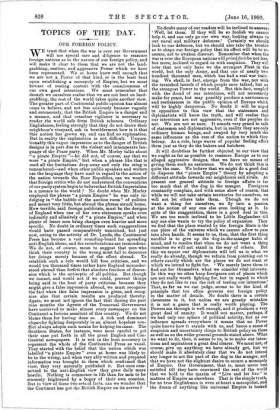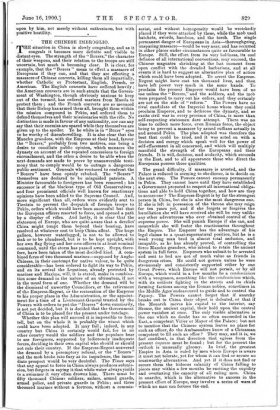TOPICS OF THE DAY.
OUR FOREIGN POLICY.
WE trust that when the war is over our Government will use special care and diligence to reassure foreign nations as to the nature of our foreign policy, and will make it clear to them that we are not the land- grabbing, restless, and aggressive Power which we have been represented. We at home know well enough that we are not a Power of that kind, or in the least bent upon establishing a monopoly of Empire, but we must beware of resting content with the consciousness of our own good intentions. We must remember that though we ourselves realise that we are not bent on land- grabbing, the rest of the world takes quite another view. The greater part of Continental public opinion has almost come to believe, and not less anxiously because vaguely and erroneously, that the British Empire is a danger and a menace, and that ceaseless vigilance is necessary to render ,the world safe from British schemes. Ordinary Englishmen, feeling strongly that they do not desire their neighbour's vineyard, ask in bewilderment how is it that this notion has grown up, and can find no explanation. But in reality the explanation is not difficult. Unques- tionably this vague impression as to the danger of British designs is in part due to the violent and intemperate lan- guage of the Peace party. When Mr. Morley talks about " a pirate Empire "—he did not, of course, say that we were "a pirate Empire," but when a phrase like that is used all the limitations drop away and only the sting is remembered-L-and when other public speakers and writers use the language they have used in regard to the action of the nation towards the Boer Republics, can we wonder that foreign critics who do not understand the conventions of our party system begin to believe that British Imperialism is a menace to the world ? No doubt when Mr. Morley employed the phrase "a pirate Empire" he was only in- dulging in "the babble of the auction room" of politics and meant very little, but abroad the phrase struck home. How terrible, said foreign publicists, must be the designs of England when one of her own statesmen speaks even indirectly and allusively of "a pirate Empire," and when plenty of lesser men bring charges even heavier and more specific. No doubt in ordinary times such exaggerations would have passed comparatively unnoticed, but just now, owing to the activity of Dr. Leyds, the Continental Press has become a vast sounding-board for spreading anti-English abuse, and the reverberations are tremendous. We do not, of course, mean to suggest that men who think their country in the wrong must fail to denounce her doings merely because of the effect abroad. To establish such a rule would kill free criticism, and we would ten thousand times rather have England misunder- stood abroad than forfeit that absolute freedom of discus- sion which is the antiseptic of all politics. But though we cannot, and would not if we could, prevent things being said in the heat of party criticism because they might give a false impression abroad, we must recognise the fact when this false impression is given, and recog- nise also that certain results are produced thereby. Again, we must not ignore the fact that during the past nine months the Agents of the Transvaal Government have contrived to make almost every newspaper on the Continent a furious assailant of this country. We do not blame them for having done so. A rich and dominant oligarchy fighting desperately in an almost hopeless con- flict always adopts such means for helping its cause. The Southern States, for instance, were most careful to get their case put forth in all the great English and Con- tinental newspapers. It is not in the least necessary to represent the whole of the Continental Press as venal. They started with the belief that the nation which was labelled "a pirate Empire" even at home was likely to be in the wrong, and when very ably written and prepared information was brought fo them which confirmed that view, they very naturally published it. But once com- mitted to the anti-English view they grew daily more hostile. Nothing is commoner in life than for men to be sincerely frightened by a bogey of their own creation. But in view of these two sets of facts, can we wonder that the Continent has got the British Empire on its nerves ? No doubt many of our readers will be inclined to answer: Well, let them. If they will be so foolish we cannot help it, and can only go our own v looking always to our naval and military defences.' Certainly, we should look to our defences, but we should also take the trouble so to shape our foreign policy that its effect will be to re. assure, not to awaken distrust. Remember that when the war is over the European nations will prim8faciebe not less, but more, inclined to regard us with suspicion. They will note that not only have we the strongest Fleet in the world, but the only Army, and that one of nearly two hundred thousand men, which has had a real war train- ing. We shall, in fact, emerge from the war, not with the tarnished laurels of which people once talked, but as the strongest Power in the world. But this fact, coupled with the dread of our intentions, will not necessarily make for peace, but may possibly produce a nervousness and restlessness in the public opinion of Europe which will be highly dangerous. No doubt it will be urged in opposition to this view that the statesmen and diplomatists will know the truth, and will realise that our intentions are not aggressive, even if the peoples do not. We are not so sure. It sounds very grand to talk of statesmen and diplomatists, but in reality they are only ordinary human beings, and swayed by very much the same influences as the rest of the nation to which they belong. As a rule, large waves of popular feeling affect them just as they do the bakers and butchers.
It will doubtless be further objected to our view that we ought as far as possible to reassure Europe as to our alleged aggressive designs, that we have no means of giving them such an assurance. We do not think this is quite the case. We believe that we might do a good deal to disperse the "pirate Empire" theory by adopting a .different attitude towards our neighbours and rivals. At present our general attitude in foreign affairs is far too much that of the dog in the manger. Foreigners constantly complain, and with some show of reason, that while we will not take certain territories for ourselves, we will not let others take them. Though we do not want a thing for ourselves, we fly into a passion at the notion of any one else even looking at it. In spite of the exaggeration, there is a good deal in this. We are too much inclined to be Little Englanders till any one else wants to try the policy of expansion. Then we find that the place wanted by the foreign State is the one piece of the universe which we cannot allow to pass into alien hands. It seems to us, then, that the first thing needful is to give up the dog-in-the-manger habit of mind, and to resolve that when we do not want a thing ourselves we will not stand in the way of others. But this we expect our diplomatists will tell us is what we really do already, though we refrain from pointing out to others exactly which are the places we do not want or which we intend to fight for. We merely leave them to find out for themselves what we consider vital interests. In this way we often keep foreigners out of places which are not really worth fighting for, but in regard to which they do not like to run the risk of testing our intentions.' That, as far as we can judge, seems to be the kind of principle that too often governs our foreign policy in the matter of details. No doubt there is a certain cleverness in it, but unless we are greatly mistaken it is not a game that is really worth playing. The Powers see through it well enough, and it produces a very great deal of enmity. It would not matter, perhaps, if we had only one sphere of political activity, but as our influence spreads everywhere it means that no Power quite knows how it stands with us, and hence a sense of suspicion and uncertainty clings to British policy on these as well as on the wider general grounds stated above. What we want to do, then, it seems to us, is to make our inten- tions and aspirations a great deal clearer. We must not, of course, give up anything we have already got, but we should make it absolutely clear that we do not intend any longer to act the part of the dog in the manger, and that we have not the slightest desire to secure a monopoly of Empire. Our Government, that is, must never rest satisfied till they have convinced the rest of the world that we hold to the maxim of "Live and let live" in matters of Empire as elsewhere. That is the simple truth, for no true Englishman is even at heart a monopolist, and the dream of anything like universal Empire is looked upon by him, not merely without enthusiasm, but with positive hostility.







































 Previous page
Previous page